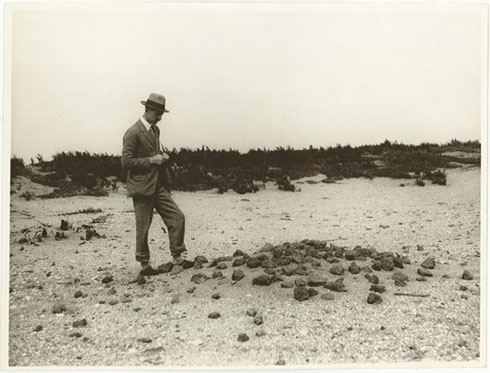[center]George Pitt, 1st Baron Rivers (1 May 1721 ? 7 May 1803) was a British diplomat and politician.[/center]
 [center]Pitt-Rivers in Victoria, Australia, 1910.[/center]
[center]Pitt-Rivers in Victoria, Australia, 1910.[/center][center][large]George Pitt-Rivers - Conscience and fanatism.pdf (3.92 MB)
http://www.balderexlibris.com/index.php ... fanaticism
George Pitt-Rivers - The World Significance of the Russian Revolution.pdf (18.58 MB)
http://www.balderexlibris.com/index.php ... Revolution[/large][/center]
[justify]On 27 June 1940, the Dorset constable arrested one of the county?s most prominent landowners in accordance with orders received from London. The target of the police raid, George Pitt-Rivers, was long known to government investigators for his unusual views and public statements, many of which were seen as supporting Adolf Hitler?s Nazi government.
Only a decade before his arrest, Pitt-Rivers had been a prominent and respected British anthropologist, conducting fieldwork in the South Pacific and receiving praise for his scientific publications. Throughout the 1920s and 1930s he was also closely involved with a wide variety of social reform movements including eugenics and birth control advocacy, in addition to various groups seeking agricultural reform and post-First World War reconciliation with Germany.
For more than five decades following his death in 1966, Pitt-Rivers was almost entirely forgotten to historians as one of the many interwar figures who had simply ended up on the ?wrong side? of history and subsequently disappeared.
In mid-2009, I contacted the Pitt-Rivers family as part of my doctoral research into the interwar eugenics movement?s international ties. My interest in Pitt-Rivers had been entirely incidental: as I examined existing archival collections from the period I was unavoidably confronted with the Pitt-Rivers name, and it was clear that ?Capt. Pitt-Rivers?, as he was often called, was present in many of the high-level meetings I was examining.
Shortly after sending my initial letter, I received a gracious reply from the Pitt-Rivers family giving me access to a private collection of documents housed in the attic of their family home in Dorset. Immediately recognizing the significance of the collection, I contacted Allen Packwood and his staff at the Churchill Archives Centre and now, thanks to their extraordinary efforts, the Pitt-Rivers papers are properly conserved and available for future generations to consult.
The true strength of the Pitt-Rivers collection is its remarkable breadth of content. The oldest documents in the archive date from the late 1910s, when Pitt-Rivers returned to England after being badly wounded in the First World War. There are numerous letters from this era discussing anthropological theory, Frederick Nietzsche, socialism, and anti-Semitic conspiracy theories. Historians of anthropology will find many letters and unpublished manuscripts of interests, all dating from an era when anthropological methodology was still largely in its infancy. There is also an extensive collection of never-published photographs from the South Pacific, many of which illustrate tribal customs and practices.
The majority of the collection?s materials date from the 1930s, when Pitt-Rivers began to increase his political involvement. There are numerous documents relating to his involvement with the Eugenics Society and various pro-birth control organisations, along with various documents related to pro-agriculture groups. Later documents also relate to Pitt-Rivers? involvement with Oswald Mosley?s British Union of Fascists and other groups including the Anglo-German Fellowship, an organisation seeking to build closer relations between Britain and Nazi Germany. Following his arrest, Pitt-Rivers became one of the few detainees to legally appeal his 18B detention, and a number of items provide important insights into how this controversial government initiative functioned and was legally justified.
The Pitt-Rivers collection provides important new insights into the turbulent decades between the First and Second World Wars, and I am very grateful to the Pitt-Rivers family for making these items available for both my own research and that of future scholars. It is fitting that these important sources now reside in the Churchill Archives Centre, where they can be consulted by anyone seeking to examine the complicated and oft-forgotten dynamics of the time alongside the papers of the era?s leading statesmen.
Bradley W. Hart, Churchill College, Cambridge University
http://www.chu.cam.ac.uk/archives/blog/?p=23[/justify]